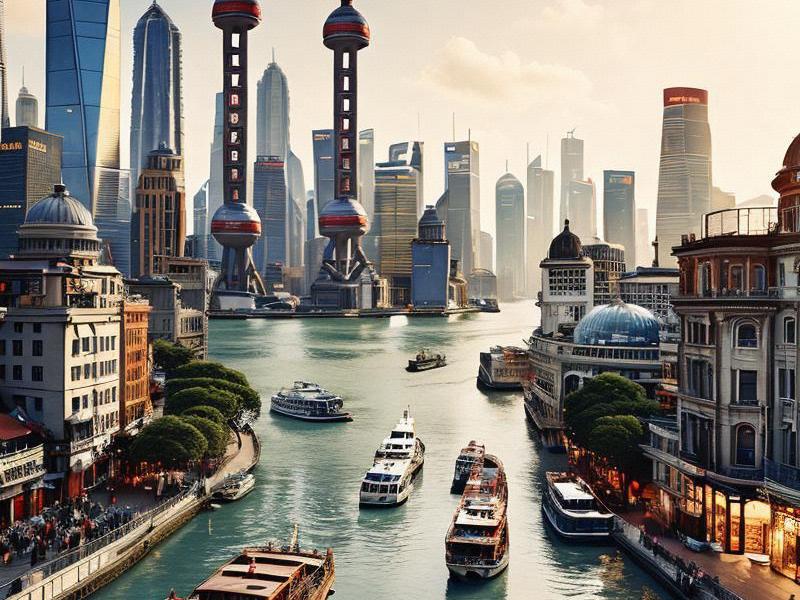This article delves into the remarkable transformation of Shanghai, exploring its evolution from a historic port city to a global economic and cultural powerhouse. It highlights the city's architectural marvels, cultural diversity, and its position as a vital node in the global economy.

Shanghai, the bustling metropolis on the banks of the Huangpu River, has long been a symbol of China's rapid modernization. Over the past few decades, the city has undergone a remarkable transformation, emerging as a global economic hub and a cultural melting pot. This article takes a closer look at Shanghai's renaissance, exploring its architectural wonders, cultural fusion, and economic significance.
The architectural landscape of Shanghai is a testament to the city's dynamic evolution. The Bund, once a collection of colonial-era buildings, now stands as a showcase of historical architecture juxtaposed against the futuristic skyline of Pudong. The iconic Oriental Pearl Tower, with its striking design, is a beacon of modernity, while the Jin Mao Tower and the Shanghai World Financial Center pierce the clouds, symbolizing the city's ambition and progress.
Pudong, in particular, has become synonymous with Shanghai's modern face. Once a rural area, it has been transformed into a district of glass towers and high-tech enterprises. The Lujiazui Financial District houses some of the world's tallest skyscrapers, including the Shanghai Tower, which stands as the tallest building in China and the second-tallest in the world. This area is not just a financial hub but also a cultural and recreational center, with parks, museums, and shopping malls.
The cultural fabric of Shanghai is equally rich and diverse. The city is known for its blend of traditional Chinese culture and Western influences. The French Concession, with its charming cobblestone streets and colonial architecture, offers a glimpse into the city's colonial past. Meanwhile, areas like Nanjing Road and Huaihai Road are bustling with modern shopping and dining experiences, reflecting the city's cosmopolitan character.
爱上海419论坛 Shanghai's art scene is thriving, with galleries and museums showcasing both traditional Chinese art and contemporary works. The Shanghai Museum, located in People's Square, is renowned for its extensive collection of ancient Chinese art, including ceramics, bronzes, and calligraphy. The city also hosts numerous international art exhibitions and festivals, attracting artists and art enthusiasts from around the globe.
Cultural fusion is evident in the city's cuisine, music, and fashion. Shanghai's culinary scene is a delightful mix of traditional Shanghainese dishes and international flavors. From the famous xiaolongbao (soup dumplings) to the trendy bars and restaurants in areas like Xintiandi, the city offers a culinary adventure that caters to all tastes.
The city's music scene is vibrant, with live music venues and jazz clubs scattered across the city. Shanghai's jazz tradition dates back to the 1930s and continues to thrive today, with the annual Shanghai International Jazz Festival drawing big names and crowds from around the world. The city's fashion industry is also booming, with designers and boutiques creating a unique blend of Eastern and Western styles.
Economically, Shanghai is a powerhouse, playing a crucial role in China's rise as a global economic leader. The city is home to the Shanghai Stock Exchange, one of the largest in the world, and is a major center for finance, trade, and logistics. Its port, the Port of Shanghai, is the busiest container port in the world, handling millions of containers annually.
上海龙凤论坛419
Shanghai's economic success is not limited to finance and trade. The city is also a hub for technology and innovation, with companies like Alibaba, Tencent, and Huawei having significant operations there. The Zhangjiang Hi-Tech Park is a center for research and development, fostering innovation in fields such as biotechnology, information technology, and new materials.
The city's government has been proactive in promoting sustainable development and smart city initiatives. Shanghai is investing in green technologies and renewable energy, aiming to reduce its carbon footprint and improve environmental quality. Smart city projects, such as intelligent transportation systems and digital governance, are enhancing the quality of life for residents and visitors alike.
Education is another area where Shanghai excels. The city is home to some of the best universities in China, including Fudan University and Tongji University, which attract students and researchers from around the world. Shanghai's education system is known for its rigor and innovation, producing graduates who contribute to the city's economic and social development.
上海龙凤419足疗按摩 Tourism is a significant contributor to Shanghai's economy, with millions of visitors drawn to the city's attractions each year. In addition to the Bund, Pudong, and the Shanghai Museum, popular destinations include the Yu Garden, a classical Chinese garden, and the Shanghai Zoo, home to a wide range of animals. The city's nightlife, with its vibrant bars, clubs, and live music venues, is also a major draw for tourists.
Despite its rapid development, Shanghai remains committed to preserving its history and culture. Efforts have been made to protect historic buildings and neighborhoods, ensuring that the city's heritage is not lost in its pursuit of modernity. Initiatives such as the Old City God Temple and the Yuyuan Garden restoration project reflect the city's dedication to maintaining its cultural identity.
Shanghai's renaissance is a story of resilience, innovation, and cultural fusion. The city's transformation from a historic port to a global economic and cultural hub is a testament to its people's vision and determination. As Shanghai continues to grow and evolve, it remains a beacon of progress and a symbol of China's aspirations on the world stage.
In conclusion, Shanghai's journey through modern transformation is a fascinating tale of how a city can embrace change while preserving its heritage. The architectural marvels, cultural diversity, and economic significance of Shanghai make it a unique and dynamic destination. As the city looks to the future, its commitment to sustainability, innovation, and cultural preservation ensures that its renaissance will continue for generations to come.